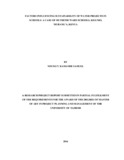| dc.description.abstract | Water is a natural resource that is necessary for sustenance of life, ecological systems and
a key resource to social and economic development. Governments, Non-governmental
organizations, local and international organizations from all over the world have
implemented water projects to promote safe rural water supply and sanitation over the
years. However, in most project areas there is lack of sustainability of these water
infrastructures and water supply systems. The purpose of this study was to investigate the
factors that influence sustainability of water projects in schools. Muthithi ward schools
are selected as the case for the study. The study employed descriptive research design.
The target population of this study was 320 teachers and 16 school administrators. Simple
random sampling was used in this study and a census. Through random sampling 76
teachers were selected for the study. Primary data for the study was collected using
structured questionnaires that were administered to the respondents by the researcher.
Data collected was edited, coded and analyzed using SPSS. Findings were presented
using tables. The findings of the study indicated that community participation, level of
education, management skills and follow up support do influence sustainability of school
water projects. The study recommends that beneficiary involvement is key to
sustainability, project designers should ensure there is a check list to check and ensure
beneficiaries are involved adequately at all project stages and community participation in
the whole project cycle be enhanced, there should be an analysis of capacity needed for
the community to run a project without external help and as such sustain project benefits,
Water projects should rely on more sustainable methods and strategies, donors should
have adequate budgets for any water projects designed for implementation and
organizations should strongly support monitoring and evaluation of their water projects
besides ensuring that community responsible for management and operation of water
projects are well trained in operation and maintenance | en_US |



